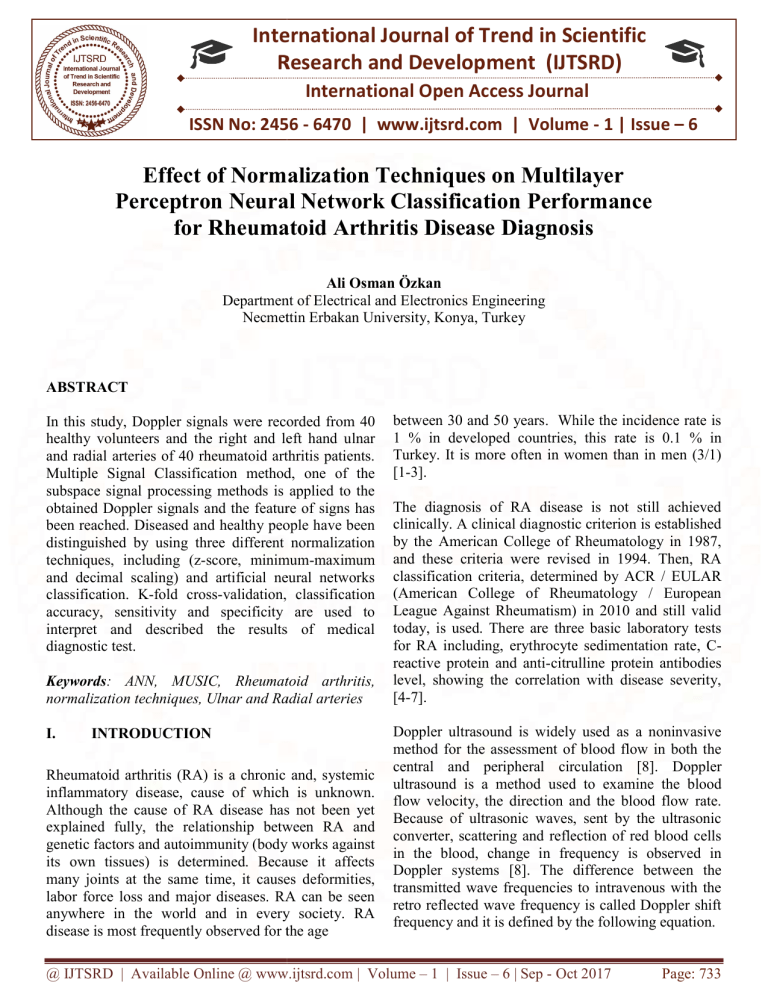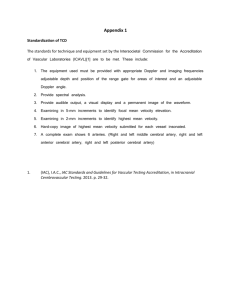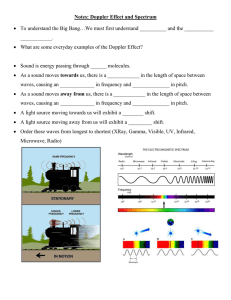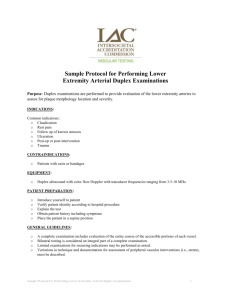
International Journal of Trend in Scientific
Research and Development (IJTSRD)
International Open Access Journal
ISSN No: 2456 - 6470 | www.ijtsrd.com | Volume - 1 | Issue – 6
Effect of Normalization Techniques on Multilayer
Perceptron Neural Network Classification Performance
for Rheumatoid Arthritis Disease Diagnosis
Ali Osman Özkan
Department of Electrical and Electronics Engineering
Necmettin Erbakan University
University, Konya, Turkey
ABSTRACT
In this study, Doppler signals were recorded from 40
healthy volunteers and the right and left hand ulnar
and radial arteries of 40 rheumatoid arthritis patients.
Multiple Signal Classification method, one of the
subspace signal processing methods is applied to the
obtained Doppler signals and
nd the feature of signs has
been reached. Diseased and healthy people have been
distinguished by using three different normalization
techniques, including (z-score,
score, minimum
minimum-maximum
and decimal scaling) and artificial neural networks
classification. K-fold cross-validation,
validation, classification
accuracy, sensitivity and specificity are used to
interpret and described the results of medical
diagnostic test.
Keywords: ANN, MUSIC, Rheumatoid arthritis,
normalization techniques, Ulnar and Radial arteries
I.
INTRODUCTION
Rheumatoid arthritis (RA) is a chronic and, systemic
inflammatory disease, cause of which is unknown.
Although the cause of RA disease has not been yet
explained fully, the relationship between RA and
genetic factors and
nd autoimmunity (body works against
its own tissues) is determined. Because it affects
many joints at the same time, it causes deformities,
labor force loss and major diseases. RA can be seen
anywhere in the world and in every society. RA
disease is most frequently
requently observed for the age
between 30 and 50 years. While the incidence rate is
1 % in developed countries, this rate is 0.1 % in
Turkey.. It is more often in women than in men (3/1)
[1-3].
The diagnosis of RA disease is not still achieved
clinically. A clinical diagnostic criterion is established
by the American College of Rheumatology in 1987,
and these criteria were revised in 1994. Then, RA
classification criteria, determined by ACR / EULAR
EUL
(American College of Rheumatology / European
League Against Rheumatism) in 2010 and still valid
today, is used. There are three basic laboratory tests
for RA including, erythrocyte
hrocyte sedimentation rate, CC
reactive protein and anti-citrulline
citrulline protein antibodies
level, showing the correlation with disease severity,
[4-7].
Doppler ultrasound is widely used as a noninvasive
method for the assessment of blood flow in both the
central
tral and peripheral circulation [8]. Doppler
ultrasound is a method used
sed to examine the blood
flow velocity, the direction and the blood flow rate.
Because of ultrasonic waves, sent by the ultrasonic
converter, scattering and reflection of red blood cells
in the blood, change in frequency is observed in
Doppler systems [8]. The difference between the
transmitted wave frequencies to intravenous with the
retro reflected wave frequency is called Doppler shift
frequency and it is defined by the following equation.
@ IJTSRD | Available Online @ www.ijtsrd.com | Volume – 1 | Issue – 6 | Sep - Oct 2017
Page: 733
International Journal of Trend in Scientific Research and Development (IJTSRD) ISSN: 2456-6470
f = f t - fr =
d
2vCosθ
c
ft
(1)
Here, fd is the mean Doppler shift frequency, f t is
the frequency of the ultrasonic wave sent to the vein,
is the frequency of ultrasonic waves reflected
fr
back from the vein, v is the speed of the particles in
the blood, c is the speed of the ultrasonic waves in
the ambient and θ is the Doppler angle [9-10].
In this study, as spectral analysis method the Multiple
Signal Classification (MUSIC) method has been used
to extract the significant features from the right and
left hand Ulnar and Radial arteries Doppler signals for
diagnosing the RA disease. MUSIC method model
with degrees of 5, 10, 15, 20, and 25 were used in the
process of feature extraction from the Doppler signals
belonging to the right and left hand Ulnar and Radial
arteries. MUSIC spectral analysis method is used to
transform Doppler signals from the time domain to
the frequency domain. The MUSIC method was
proposed by R.O. Schmidt in 1979 as an improvement
to Pisarenko’s method [11].
II. Materials and Methods
A. People Participating in
Acquisition Doppler Signal
the
Study
and
40 patients diagnosed with RA based on the criteria of
American College of Rheumatology and 40 healthy
volunteers have participated in this study. 40 RA
patients and 40 healthy volunteers have been
evaluated by specialist doctor in Necmettin Erbakan
University, Meram Medical Faculty and in Physical
Medicine and Rehabilitation. The right and the left
hand ulnar and radial artery Doppler signals of both
40 RA patients (36 women, 4 men, 38-70 age range,
52 ± 9.1 average and standard deviation of age) and
40 healthy volunteers (36 women, 4 men, 44-72 age
range, 56 ± 8.6 average and standard deviation of age)
are recorded [18].
The ulnar and radial arteries carry blood to our hand
in two vessels. While the ulnar artery moves from the
inner part of the arm, the radial artery moves the part
where the thumb.
Artificial neural networks (ANN) method is widely
used especially in biomedical signal processing. The
concept of ANN has emerged with the idea of
mimicking the brain's working principles on digital
computers. The human brain makes a completely
different way operation than traditional computer.
ANN has complex, non-linear and parallel distributed
structure. ANN is a designed structure to model of the
performance of a particular job or a function of the
brain. The power of ANN stems arises from learning,
generalization ability and ability to make parallel
process. ANN is a system to use the parallel
computing techniques, to establish the relationship
between inputs and outputs with the connection
between the artificial neurons, to produce complex
and non-linear models [12].
Doppler ultrasound signals have been recorded by
specialist doctors using General Electric Loqio S6
Doppler ultrasound equipment in the Radiology
Department of Meram Medical Faculty of Necmettin
Erbakan University. To obtain quality output,
standard ultrasound probe angle is fixed to 60 degree
with electronic straightening methods and manual
orientation. In all tests performed on the patients and
healthy subjects, the insonation angle and the
presetting of the ultrasound were kept fixing. The
sampling volume was placed within the center of the
arterial. The amplification gain was carefully set to
obtain a clean spectral output with minimized
background noise on the spectral display. The system
used to record and process the Doppler signals
consists of two parts, Power Doppler ultrasound unit
with 12 MHz linear ultrasound probe and a laptop
[18].
The literature shows that studies have focused on
images obtained from the RA disease by using
devices such as Doppler ultrasound and magnetic
resonance images in diagnosing RA disease [13-15].
Furthermore, there are also studies for the diagnosis
of various diseases by means of Doppler ultrasound
signals [16-17].
The Doppler audio signals taken from audio output of
Power Doppler ultrasound device have sampled at
44.1 kHz and have been transferred to the computer
so that spectral analysis can be performed and
properties of these signals can be removed [18]. The
flow of designed system is shows in Figure 1.
@ IJTSRD | Available Online @ www.ijtsrd.com | Volume – 1 | Issue – 6 | Sep - Oct 2017
Page: 734
International Journal of Trend in Scientific Research and Development (IJTSRD) ISSN: 2456-6470
Measurement
of Doppler
signals
Acquisition of left and right hand
Radial arterial Doppler signals
Feature
extraction
process
Feature extraction from Doppler
signals using the MUSIC spectral
analysis methods
Classification
using the
WEKA
Classification of left and right
hand Radial arterial Doppler
signals as healthy and RA disease
Classification
results
Healthy or RA disease
Figure 1. Flow diagram of the designed system to
obtain the Doppler signal and the classification.
B. Spectral Analysis of Doppler Signal with
MUSIC
Although signs exist physically on the time axis, these
are shown in the frequency axis because the
sinusoidal component is considered to occur at
different frequencies. Signs are shown on the
frequency axis and it is named as spectrum. Spectral
analysis methods are used to show the distribution of
power that is included in any signal over the
frequency range. Spectral analysis is divided into 3
parts in itself. These are non-parametric (classic)
spectral analysis methods, parametric (modern)
spectral analysis methods and the subspace-based
spectral analysis methods. Although non-parametric
signal processing methods are not very good due to
lack of performance, these methods are have more
advantageous than other methods in terms of the small
load operation and ease of application [19-21].
MUSIC is an acronym which stands for multiple
signal classification. It is high resolution technique
based on exploiting the eigen-structure of input
covariance matrix. The advantage of this algorithm is
that it exhibits high resolution. The MUSIC method is
also a noise subspace frequency estimator. The
MUSIC method proposed by Schmidt [11] eliminates
the effects of spurious zeros by using the averaged
spectra of all of the eigenvectors corresponding to the
noise subspace. The resultant PSD is determined
from:
1
PMusic ( f ) =
1 K-1
2
( ) Ai (f )
K i =0
(2)
Where K the dimension of noise is subspace and
Ai (f ) is the desired polynomial that corresponds to all
the eigenvectors of the noise subspace [11].
C. Normalization Methods
Normalization method is a data pre-processing
technique used to enhance the performance of the
artificial intelligence systems. Normalization process
is to move the data set with mxn size from one space
to another space. New maximum and minimum points
are occurred in transport operation but there is no
change in the size of the data set mxn. If performed
normalization method is appropriate for the transfer
characteristics of artificial intelligence, obtained
results become more successful. Especially, the
transfer function has a special significance in the
sarch for a solution based on ANN. Logsig transfer
function is the transfer function commonly used in
neural network applications and it makes data
normalization to the 0-1 range [22-24]. Whatever type
of normalization, data is normalized on the basis of
column independently of each other especially in the
data set with different properties. Each data column
shows a feature in the data with discrete features and
applies to separately each feature in normalization
[22-24].
In the literature, there are many normalization
methods. In this study, three most widely used
normalization methods in engineering applications
were used. These are minimum- maximum method,
decimal scaling method and Z- score method [22-24].
Minimum-maximum
normalization
method
normalizes the data linearly. While the minimum
refers the lowest value in the corresponding column,
the maximum refers the highest value in the
corresponding column. Equation 3 indicated below is
used to reduce the range of 0-1 by minimummaximum normalization method.
x=
x -x
i
min
x max - x
min
@ IJTSRD | Available Online @ www.ijtsrd.com | Volume – 1 | Issue – 6 | Sep - Oct 2017
(3)
Page: 735
International Journal of Trend in Scientific Research and Development (IJTSRD) ISSN: 2456-6470
In Equation 3, the normalized data, the raw data,
the smallest number of columns which the raw data is
available and the biggest number of columns which
the raw data is available [22-24].
Decimal scaling method is a division operation that
makes numbers less than 1. Decimal scaling
normalization process is shown in Equation 4.
x=
xi
10
(4)
j
According to Equation 4, j can be defined as the
smallest value which makes the column values
smaller than 1.
Z-Score used for statistical evaluation is data preprocessing method. Mean values and standard
deviation of each column must be calculated to
normalize values. Z-scores generate new values for
the average value of the data with the distances from
the average of these values. After the normalization of
the Z-score, the average is obtained by a Gaussian
distribution with zero. Z-score normalization process
is shown in Equation 5.
x -μ
i
x= i
σ
i
(5)
In Equation 5, the normalized data, the raw data,
the average of the raw data found in column and the
standard deviation of the raw data found in column.
D. Classification of the Doppler Signal with
WEKA
An artificial neural network (ANN) is a flexible
mathematical structure which is capable of identifying
complex nonlinear connections between input and
output data sets. ANN models have been found useful
and efficient, especially in problems for which the
characteristics of the processes are difficult to
describe using physical equations. The information in
ANN situates in the weights of the connections
between neurons. Training of the neural network is
performed by adjusting the values of weights. Back
propagation algorithm is one of the most widely used
in biomedical signal processing algorithm [12]. Back
propagation algorithm consists of 3 layers including
input, hidden and output layers. In back propagation
algorithm, because calculated error in output spreads
from output layer to hidden layer after then, from
hidden layer to input layer, this algorithm is called
back propagation algorithm [24- 25].
WEKA (Waikato Environment for Knowledge
Analysis), developed by the University of Waikato in
New Zealand, hosting with machine learning
algorithms, a functional graphic interface, developed
on the Java platform, open source code, is a data
mining program. WEKA has emerged initially as a
Project, but today being used by many people all over
the world as a data mining application development
program. WEKA includes various data preprocessing, classification, regression, clustering,
association rules and visualization tools. Algorithms
can be applied to the data set or calling directly from
Java code [26].
MLP (Multi-Layer Perceptron), ANN algorithm, is
used for the classification of problems that cannot be
divided into two parts by a linear function. MLP used
in this study consists of 129 features in the input
layer, 66 neurons in the hidden layer and 2 neurons in
the output layer (healthy or suffering from RA).
Standard back-propagation algorithm is a method
where a sloping landing foreseen to reach the
minimum point on the failure surface. The weight
values are updated every step in order to provide that
[12, 24-25].
For the analysis of right and left hand ulnar and radial
artery Doppler signals by using ANN, all parameters
were kept constant.
E. Conclusion
Some statistical measurements are used to evaluate
the performance of classifiers and normalization
methods used in the classification of medical data
sets. In this study, 10-fold cross with separate data
sets, classification accuracy, sensitivity and specificity
values are used in order to compare the classification
performance.
In the training and testing of MLP-ANN, a data
partition of 90–10 % (72–8) train-test was used. In our
dataset, there are 40 patients with RA diseases and 40
healthy volunteers. In totally, 80 subjects were used to
test the diagnosis of RA disease. The training input
data set consisted of 36 normal and 36 RA patients
@ IJTSRD | Available Online @ www.ijtsrd.com | Volume – 1 | Issue – 6 | Sep - Oct 2017
Page: 736
International Journal of Trend in Scientific Research and Development (IJTSRD) ISSN: 2456-6470
(72x129 samples), while the test data set was made of
4 normal and 4 RA patients (8x129 samples). In order
to evaluate the performance of the MLP-ANN
models, Classification accuracy (CA), sensitivity
(SEN) and selectivity (SPE) are calculated by the
formulas shown below.
CA = %
TP +TN
TP +FP + TN +FN
SEN= %
SPE = %
TP
TP +FN
TN
FP +TN
x100
(6)
x100
(7)
x100
(8)
In the above equations, TP, FP, TN and FN are true
positive, false positive, true negative and false
negative, respectively.
TP: RA patient identifying as RA patient
FP: A healthy person identifying as RA patient
TN: A healthy person identifying as normal
FN: RA patient identifying as normal
In this study, all procedures were performed with
WEKA machine learning program. The test result of
MLP-ANN classifier are shown in TABLE I. for the
right and left ulnar artery Doppler signals obtained by
10-fold cross validation.
The value of the classification accuracy (CA),
sensitivity (SEN) and specificity (SPE) of MLP-ANN
classifier are shown in TABLE II for the right and left
ulnar artery Doppler signals are obtained by 10-fold
cross validation.
TABLE I. THE TEST RESULT OF MLP-ANN
CLASSIFIER ARE OBTAINED BY 10-FOLD
CROSS VALIDATION
The Right Ulnar
Artery
Raw Data
Min- Max
Z- Score
Decimal Scaling
The Left Ulnar Artery
Raw Data
Min- Max
Z- Score
Decimal Scaling
The Right Radial Artery
Raw Data
Min- Max
Z- Score
Decimal Scaling
The Left Radial Artery
Raw Data
Min- Max
Z- Score
Decimal Scaling
TP
FP
TN
FN
33
36
37
36
TP
32
35
37
36
TP
35
37
39
38
TP
35
37
38
37
7
4
3
4
FP
8
5
3
4
FP
5
3
1
2
FP
5
3
2
3
32
38
38
38
TN
31
35
37
36
TN
33
38
39
38
TN
35
38
39
38
8
2
2
2
FN
9
5
3
4
FN
7
2
1
2
FN
5
2
1
2
TABLE II. THE VALUE OF THE CLASSIFICATION
ACCURACY (CA), SENSITIVITY (SEN) AND
SELECTIVITY (SPE) OF MLP-ANN CLASSIFIER ARE
OBTAINED BY 10-FOLD CROSS VALIDATION
The Right
Ulnar Artery
Raw Data
Min - Max
Z- Score
Decimal Scaling
The Left
Ulnar Artery
Raw Data
Min - Max
Z- Score
Decimal Scaling
The Right
Radial Artery
Raw Data
Min - Max
Z- Score
Decimal Scaling
The Left
Radial Artery
Raw Data
Min - Max
Z- Score
Decimal Scaling
CA
(%)
81.25
92.5
93.75
92.5
CA
(%)
78.75
87.5
92.5
90
CA
(%)
85
93.75
97.5
95
CA
(%)
87.5
93.75
96.25
93.75
SEN
(%)
80.49
94.74
94.87
94.74
SEN
(%)
78.05
87.5
92.5
90
SEN
(%)
83.33
94.87
97.5
95
SEN
(%)
87.5
94.87
97.44
94.87
@ IJTSRD | Available Online @ www.ijtsrd.com | Volume – 1 | Issue – 6 | Sep - Oct 2017
SPE
(%)
82.05
90.48
92.68
90.48
SPE
(%)
79.49
87.5
92.5
90
SPE
(%)
86.84
92.68
97.5
95
SPE
(%)
87.5
92.68
95.12
92.68
Page: 737
International Journal of Trend in Scientific Research and Development (IJTSRD) ISSN: 2456-6470
Consequently, it is seen that the classification result of
all normalization method is better than raw data in
TABLE I and II. Therefore, it obviously proves that
using the normalization method is necessary for
preprocessing of data. According to the result in
TABLE II, when classification accuracy has been
compared, z-score normalization appears to be 93.75
% in the right ulnar artery, 92.5 % in the left ulnar
artery, 97.5 % in the right radial artery and 96.25 % in
the left radial artery for the right and left ulnar and
radial artery Doppler signals. Therefore, it can be
concluded that Z-score normalization method
provides better results than other examined
normalization methods for the right and left ulnar and
radial artery Doppler signals.
IV. Acknowledgment
This work is supported by the Scientific Research
Projects of Necmettin Erbakan University.
References
[1] V. Hamuryudan, “Romatoid artrit”, İ.Ü.
Cerrahpaşa Tıp Fakültesi Sürekli Tıp Eğitimi
Etkinlikleri,
Türkiye`de
Sık
Karşılaşılan
Hastalıklar-I,
Enfeksiyon
Hastalıkları,
Romatizmal Hastalıklar, Afetlerde Ezilme
Yaralanmaları, Sempozyum Dizisi No:55, pp. 6986, 2007.
[2] G. Hatemi and H. Yazıcı, “Romatoid artrit
kliniği”, Türkiye Klinikleri J. Int. Med. Sci., vol.2,
No:25, pp:12-17, 2006.
[3] D. M. Lee and M. E. Weinblatt, “Rheumatoid
arthritis”, The Lancet 358, pp. 903-911, 2001.
[4] S. Özgöçmen, H. Özdemir, A. Kiriş, Z. Bozgeyik
and O. Ardıçoğlu, “Clinical evaluation and power
Doppler sonography in rheumatoid arthritis:
Evidence of ongoing synovial inflammation in
clinical remission”, Southern Medical Journal,
vol. 101, pp. 240-245, 2008.
[5] L. Carmona, V. Villaverdei, C. H. Garcia, J.
Ballina, R. Gabriel and A. Laffon, “The
prevalence of rheumatoid arthritis in the general
population of Spain”, Rheumatology, vol. 41, pp.
88-95, 2002.
[6] H. Elden and V. Nacitarhan, “Romatoid artritli
hastalarda sabah tutukluğu ile akut faz
reaktanlarının korelasyonu”, Türk Fiziksel Tıp
Rehabilitasyon Dergisi, vol. 51, No:1, pp. 19-21,
2005.
[7] R. Yıldırım and Y. Yazıcı, “Romatoid artritte
erken tedavi”, RAED Dergisi, vol. 4, No:2, pp.
59-67, 2012.
[8] D. H. Evans, W. N. McDicken, R. Skidmore and
J. P. Woodcock, “Doppler ultrasound: Physics,
instrumentation and clinical applications”, Wiley,
Chichester,1989.
[9] F. S. Schlindwein and D. H. Evans, “A real-time
spectrum analyzer for Doppler ultrasound
signals”, Ultrasound Med. Biol., vol. 15, No:3, pp.
263-272, 1989.
[10] B. Sigel, “A brief history of Doppler
ultrasound in the diagnosis of peripheral vascular
disease”, Ultrasound Med. Biol., vol. 24, No:2,
pp. 169-176, 1998.
[11] R. O. Schmidt, “Multiple emitter location and
signal parameter estimation”, IEEE Transactions
on Antennas Propagation ,Vol. AP-34, No:3, pp.
276–80, March 1986.
[12] S.
Haykin,
“Neural
networks:
A
comprehensive foundation”, Macmillan, New
York, 1994.
[13] K. Varsamidis, E. Varsamidou, V. Tjetjis and
G. Mayropoulos, “Doppler sonography in
assessing disease activity in rheumatoid arthritis”,
Ultrasound in Medicine & Biology, vol. 31, No:6,
pp. 739-743, 2005.
[14] A. Kiriş, S. Özgöçmen, E. Kocakoç and Ö.
Ardıçoğlu, “Power doppler assessment of overall
disease activity in patients with rheumatoid
arthritis”, Journal of Clinical Ultrasound, vol. 34,
No:1,pp. 5-11, 2006.
[15] J. Strunk, P. Klingenberger, K. Strube, G.
Bachmann, U. Müller-Ladner and A. Kluge,
“Three-dimensional doppler sonographic vascular
imaging in regions with increased MR
enhancement in inflamed wrists of patients with
rheumatoid arthritis”, Joint Bone Spine, vol. 73,
pp. 518-522, 2006.
[16] F. Dirgenali, S. Kara, N. Erdoğan, M.
Okandan, “Comparison of the autoregressive
modeling and fast Fourier transformation in
demonstrating Doppler spectral waveform
changes in the early phase of atherosclerosis”,
Computers in Biology and Medicine, vol. 35,pp.
57-66, 2005.
[17] S. Kara, “Classification of mitral stenosis from
Doppler signals using short time Fourier transform
and artificial neural networks, Expert Systems
with Applications, vol. 33, pp. 468-475, 2007.
[18] A. O. Özkan, “Investigation of changes in
Radial and Ulnar artery blood flow during the
treatment process of Rheumatoid Arthritis
Patients”, The Graduate School of Natural and
@ IJTSRD | Available Online @ www.ijtsrd.com | Volume – 1 | Issue – 6 | Sep - Oct 2017
Page: 738
International Journal of Trend in Scientific Research and Development (IJTSRD) ISSN: 2456-6470
Applied Science of Selçuk University, Ph.D
Thesis, 2010.
[19] M. H. Hayes, “Statistical Digital Signal
Processing and Modeling”, John Wiley & Sons,
Inc., 1996.
[20] J. L. Semmlow, “Biosignal and Biomedical
Image
Processing
MATLAB-Based
Applications”, Robert Wood Johnson Medical
School New Brunswick, New Jersey, 2004.
[21] A. O. Özkan, S. Kara, A. Sallı, M. E. Sakarya, S.
Güneş, “Medical diagnosis of rheumatoid arthritis
disease from right and left hand Ulnar artery
Doppler signals using adaptive network based
fuzzy inference system (ANFIS) and MUSIC
method”, Advances in Engineering Software, vol.
41, Issue 12, pp. 1295-1301, 2010.
[22] A. O. Özkan, S. Durğun, “Normalizasyon
Tekniklerinin Romatoid Artrit Hastalığı Tanısı
için YSA Sınıflama Performansına Etkisi”; pp
147-152; EEB 2016 Elektrik-Elektronik ve
Bilgisayar Sempozyumu, 11-13 Mayıs 2016,
Tokat -TÜRKİYE
[23] B. Akdemir, “A new approach to
normalization methods for improving performance
on the prediction applications”, The Graduate
School of Natural and Applied Science of Selçuk
University, Ph.D Thesis, 2009.
[24] B. Widrow and M. A. Lehr, “30 years of
adaptive neural networks: Perceptron, madaline,
and backpropagation”, Proc. IEEE, vol. 78-9, pp.
1415-1442, 1990.
[25] B. B. Chaudhuri and U. Bhattacharya,
“Efficient training and improved performance of
multilayer perceptron in pattern classification”,
Neurocomputing 34, pp. 11-27, 2000.
[26] http://www.cs.waikato.ac.nz/ml/weka/[Ziyaret
Tarihi: 2 Eylül 2017]
@ IJTSRD | Available Online @ www.ijtsrd.com | Volume – 1 | Issue – 6 | Sep - Oct 2017
Page: 739






